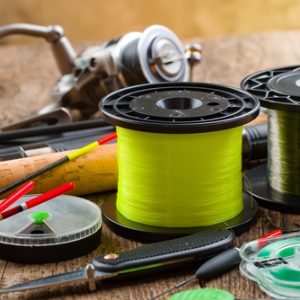What Every Angler Needs to Know: Essential Tips for Storing Fishing Gear during Winter
 As winter approaches, it’s time for anglers to start thinking about storing their fishing gear properly. Proper storage ensures that your equipment remains in good condition and is ready for use when the warm weather returns. Whether you’re a seasoned angler or just getting started, it’s important to follow some essential tips for storing fishing gear during winter. Here are some key points to consider.
As winter approaches, it’s time for anglers to start thinking about storing their fishing gear properly. Proper storage ensures that your equipment remains in good condition and is ready for use when the warm weather returns. Whether you’re a seasoned angler or just getting started, it’s important to follow some essential tips for storing fishing gear during winter. Here are some key points to consider.
1. Clean and Dry Your Gear
Before storing your fishing equipment, it’s crucial to clean and dry everything thoroughly. Start by rinsing off any dirt, saltwater, or debris from your rods, reels, and other gear. Use a mild detergent and water to clean fishing reels and remove any built-up dirt or salt deposits. After cleaning, ensure that all your equipment is completely dry before storing it. Moisture can lead to corrosion, mold, or mildew, which can damage your gear.
2. Disassemble Rods and Reels
To maximize storage space and prevent any potential damage, it’s wise to disassemble your fishing rods and reels. Separate the rod from the reel and carefully loosen the drag on your fishing reels to avoid any stress on the drag system during storage. Disassembling also allows for a thorough cleaning and provides the opportunity to inspect each component for damage or wear.
3. Check for Damage or Wear
Before storing your fishing gear, it’s essential to inspect each item for any signs of damage or wear. Check fishing rods for any cracks, loose guides, or damaged reel seats. Inspect fishing reels for any signs of rust, loose screws, or worn-out parts. Replace or repair any damaged parts to ensure that your gear is in top condition for the next fishing season.
4. Store in a Dry and Temperature-Controlled Environment
When it comes to storing fishing gear, a dry and temperature-controlled environment is essential. Moisture and extreme temperatures can cause damage to your equipment. Avoid storing your gear in damp basements, garages, or sheds that are prone to temperature fluctuations. Instead, opt for a climate-controlled area such as a closet, spare room, or temperature-controlled storage unit. Using desiccant packs or moisture-absorbing products can help eliminate excess moisture and maintain the ideal storage conditions.
5. Organize and Protect Your Gear
Proper organization is key to keeping your fishing gear in good condition during the winter months. Use fishing rod racks or vertical holders to store rods safely. This prevents them from bending or warping over time. Store reels separately in protective cases or individual reel bags to prevent damage and keep them dust-free. Additionally, use tackle boxes or storage bins to keep your hooks, lures, lines, and other small accessories organized and easily accessible.
6. Maintain Fishing Lines
Fishing lines are susceptible to damage from UV rays, moisture, and temperature changes. Before storing your fishing lines, check for any signs of wear, such as fraying or discoloration. If you notice any issues, consider replacing the line. It’s also a good idea to loosen the tension on the fishing reel’s drag system to prevent it from being under constant pressure during storage. Properly maintaining and storing your fishing lines ensures their longevity and performance.
7. Protect Your Reels from Corrosion
Fishing reels are one of the most important pieces of gear, and taking steps to protect them from corrosion is crucial. Before storing your reels, clean them thoroughly using a mild detergent and water. Apply a thin layer of reel lubricant or corrosion inhibitor to all metal surfaces to provide protection against moisture and corrosion. Avoid using excessive lubricant, as it can attract dirt and debris. Ensure that all reels are stored in a dry and dust-free area to prevent any damage.
8. Regularly Check and Maintain Storage
Even during winter storage, it’s important to periodically check on your fishing gear. Inspect rods, reels, and other equipment for any signs of damage or pests. Keep an eye out for any changes in the storage environment, such as leaks or excessive humidity. Regularly inspecting and maintaining your storage area ensures that your gear remains safe and in optimum condition throughout the winter.
Conclusion
By following these essential tips for storing fishing gear during winter, you can ensure that your equipment remains in top condition and ready for action when fishing season returns. Proper cleaning, organization, and protection from moisture and temperature changes are key to keeping your gear in excellent shape, allowing you to enjoy countless fruitful fishing trips in the future.
Fishing Tours With Phantom Tri-River Charters
Phantom Tri-River Charters is your one-stop for Alaskan fishing tours. Our goal is to ensure that you have an excellent fishing trip. We want to create memories that will last a lifetime! We fish a variety of different salmon types, including Sockeye, Silvers, Chums, Kings, and Pinks, as well as a number of other fish variations, which include rainbow trout, Dolly Varden, arctic grayling, and more. We’ll provide all of the freshwater gear you need to get your line baited and in the water, making it easy to enjoy your trip while reaping the benefits of a bountiful habitat. The catch rate on our trips is superb and you’re sure to reel in a catch that you can be proud to show off! Reach out to us online today, you’ll be glad that you did.
